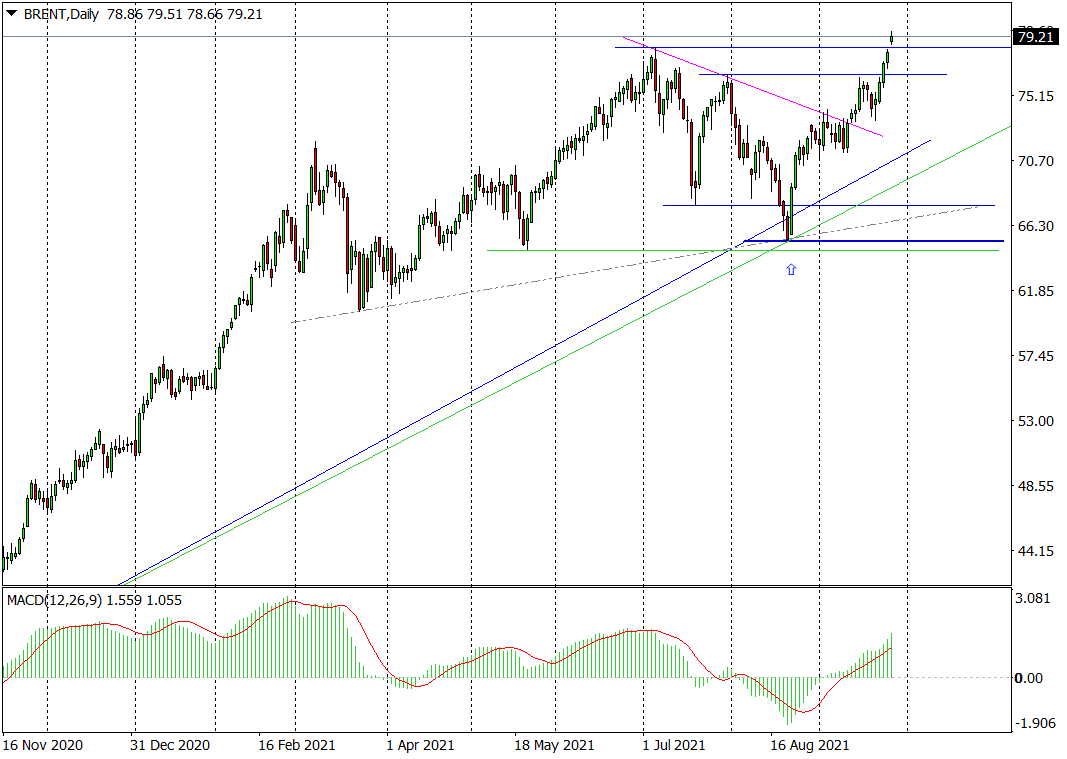Crude oil is the most expensive in 3 years [Market comment]
The last week of September on the Brent crude oil market began with an open bull market, a break above the July peak and a test of the highest levels in 3 years. The prices of this crude oil are rising by 1,4 percent today. up to $ 79,21. The nearest significant resistance is the October 2018 peak. It creates a supply barrier at the level of USD 86,64.
Why is oil more expensive?
Oil becomes more expensivebecause the demand for oil is greater than it can be satisfied by the increase in supply. The greater demand for oil is primarily the effect of a stronger scale of the post-and-demic rebound in the global economy, which, contrary to original expectations, has not yet been slowed down by the Delta variant of the coronavirus. Therefore, it can be expected that the price increases are not over yet.

USD / PLN daily chart. Source: Tickmill
From the August 20 trough, i.e. in just over a month, a barrel of Brent crude rose by 21,25 percent. Goldman Sachs analysts forecast that a barrel of Brent crude oil will rise to USD 90 by the end of this year. This would be in line with the current technical situation on the daily chart, as after today's break above the July peak, the road to the highs from three years ago (USD 86,64) is open.
Analysts expect slightly cheaper oil only next year. At least those of Citibank. They forecast the average price of a barrel at $ 67. This is $ 2 less than the annual average price they forecast this year.






















![Forex Club – Tax 9 – Settle tax on a foreign broker [Download the Application] Forex Club - Tax 9](https://forexclub.pl/wp-content/uploads/2024/02/Forex-Club-Podatek-9-184x120.jpg?v=1709046278)
![Trading View platform – solutions tailored to the needs of traders [Review] trading view review](https://forexclub.pl/wp-content/uploads/2024/03/trading-view-recenzja-184x120.jpg?v=1709558918)
![How to connect your FP Markets account to the Trading View platform [Guide] fp markets trading view](https://forexclub.pl/wp-content/uploads/2024/02/fp-markets-trading-view-184x120.jpg?v=1708677291)
![How to invest in ChatGPT and AI? Stocks and ETFs [Guide] how to invest in chatgpt and artificial intelligence](https://forexclub.pl/wp-content/uploads/2023/02/jak-inwestowac-w-chatgpt-i-sztuczna-inteligencje-184x120.jpg?v=1676364263)


![WeWork – the anatomy of the collapse of a company valued at $47 billion [WeWork, part II] wework bankruptcy story](https://forexclub.pl/wp-content/uploads/2024/04/wework-bankructwo-historia-184x120.jpg?v=1711729561)
![Adam Neumann – the man who screwed up Softbank [WeWork, part AND] adam neumann wework](https://forexclub.pl/wp-content/uploads/2024/04/adam-neumann-wework-184x120.jpg?v=1711728724)





![How to transfer shares to another brokerage office [Procedure description] how to transfer shares to another brokerage house](https://forexclub.pl/wp-content/uploads/2024/03/jak-przeniesc-akcje-do-innego-biura-maklerskiego-184x120.jpg?v=1709556924)

![The most common mistakes of a beginner trader - Mr Yogi [VIDEO] Scalping - The most common mistakes of a beginner trader - VIDEO](https://forexclub.pl/wp-content/uploads/2024/03/Scalping-Najczestsze-bledy-poczatkujacego-tradera-VIDEO-184x120.jpg?v=1711601376)
![Learning patience: No position is also a position - Mr Yogi [VIDEO] Scalping - Learning patience - No position is also a position - VIDEO](https://forexclub.pl/wp-content/uploads/2024/03/Scalping-Nauka-cierpliwosci-Brak-pozycji-to-tez-pozycja-VIDEO-184x120.jpg?v=1710999249)
![When to exit a position and how to minimize losses - Mr Yogi [VIDEO] Scalping - When to exit a position and how to minimize losses - VIDEO](https://forexclub.pl/wp-content/uploads/2024/03/Scalping-Kiedy-wyjsc-z-pozycji-i-jak-minimalizowac-straty-VIDEO-184x120.jpg?v=1710336731)


![Crude oil is the most expensive in 3 years [Market comment] crude oil, brent](https://forexclub.pl/wp-content/uploads/2021/09/ropa-naftowa-najdrozsza.jpg?v=1632736728)



![Crude oil is the most expensive in 3 years [Market comment] Is China destroying mega-hosse](https://forexclub.pl/wp-content/uploads/2021/09/Czy-Chiny-zniszcza-mega-hosse-102x65.jpg?v=1632731148)
![Crude oil is the most expensive in 3 years [Market comment] rising energy prices](https://forexclub.pl/wp-content/uploads/2021/09/wzrost-cen-energii-102x65.jpg?v=1632738330)









